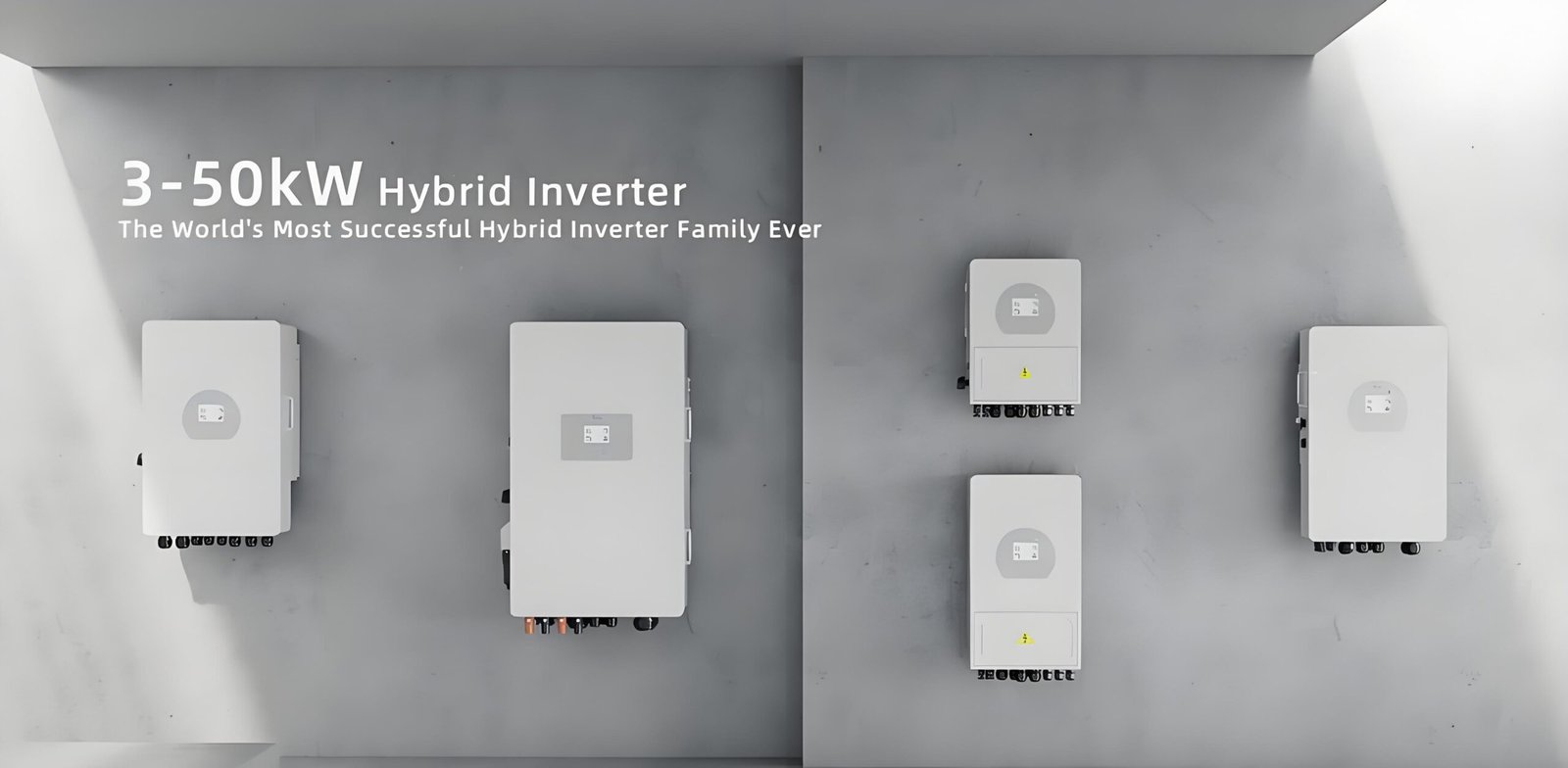Choosing the right Deye inverter model depends on several crucial factors, such as your system's power requirements, the type of inverter, compatibility with energy storage systems, and ease of installation. With the right inverter, you can ensure maximum energy efficiency, better system performance, and optimal integration with your solar panels or battery storage solutions.
The key factors include system size, inverter type, voltage compatibility, MPPT technology, efficiency ratings, monitoring features, and compatibility with energy storage systems.
System Size and Power Requirements
Evaluate Your Energy Needs:
The first step in selecting an inverter is determining your daily energy consumption in watt-hours (Wh). This will help you calculate the power output you need from your inverter. By understanding your energy requirements, you can select an inverter that can handle your system’s expected power output.
Inverter Ratings:
Deye offers various inverter models with different power ratings such as 3 kW, 5 kW, and 10 kW. It's essential to choose an inverter with a capacity that matches or exceeds your solar panel output and energy consumption needs. For example, if your solar system generates 6 kW and your daily consumption is 5 kW, you’ll need an inverter that supports at least 6 kW.
| Power Rating | System Size | Suggested Inverter Size |
|---|---|---|
| 3 kW | Small Residential | 3 kW or higher |
| 5 kW | Medium Residential | 5 kW or higher |
| 10 kW | Large Residential/Commercial | 10 kW or higher |
Type of Inverter
Hybrid vs. Grid-Tie Inverter:
One important decision is whether you need a hybrid inverter1 or a grid-tie inverter2. A hybrid inverter can work with battery storage and is ideal for those who want backup power during outages or to maximize solar energy usage. On the other hand, a grid-tie inverter connects directly to the grid without the need for battery storage, which is typically suited for those who don't need backup power.

Single-phase vs. Three-phase:
- Single-phase inverters3 are typically sufficient for residential applications, as they are designed for smaller systems with lower power requirements.
- Three-phase inverters4 are ideal for larger installations, particularly in commercial or industrial settings, where more power is required and the system needs to distribute the energy load more evenly.
| Inverter Type | Best For | Advantages |
|---|---|---|
| Hybrid Inverters | Residential and Off-grid | Backup power, integration with storage |
| Grid-tie Inverters | Grid-connected systems | Simple, no need for storage |
| Single-phase | Residential | Lower cost, adequate for small systems |
| Three-phase | Commercial/Industrial | Better for larger systems, balanced load |
Voltage Compatibility
Input Voltage Requirements:
The input voltage range of the inverter must match the voltage of your solar panels and battery bank. For instance, some Deye models are designed to operate within specific voltage ranges, such as 40-60V for battery input. Make sure to verify that the inverter is compatible with your solar array’s voltage range and battery bank voltage if you're using a hybrid system.
Maximum Power Point Tracking (MPPT)
MPPT Technology:
MPPT (Maximum Power Point Tracking)5 is an essential feature for solar inverters. This technology ensures that the inverter extracts the maximum possible power from your solar panels by continuously adjusting to the optimal voltage and current levels. For systems with panels facing different directions or experiencing shading, MPPT ensures that the inverter can optimize each panel’s output individually, leading to better overall energy harvest.
 |
MPPT Technology | Benefits |
|---|---|---|
| Single MPPT | Simple setups, good for unshaded, uniform panel layouts | |
| Dual/Multiple MPPT6 | Maximizes output, great for systems with shading or varied panel orientations |
Efficiency Ratings
Higher Efficiency:
Look for an inverter with a high efficiency rating to ensure that more of the energy generated by your solar panels is converted into usable electricity. Inverters with higher efficiency ratings, such as 98% or higher, lead to fewer energy losses and better overall system performance.
Higher efficiency means that your solar system operates at optimal capacity, delivering more usable energy to power your appliances or charge your batteries. Deye inverters offer high efficiency, which can significantly improve the performance and cost-effectiveness of your solar setup.
Monitoring and Control Features
Data Logging and Monitoring:
Advanced monitoring capabilities allow you to track your inverter's performance, identify issues, and ensure your system is operating efficiently. Many modern Deye inverters come with Wi-Fi connectivity and offer smartphone apps or online platforms for remote monitoring. This feature can be incredibly valuable for users who want to stay on top of their system’s health and energy production.
Monitoring tools provide real-time data, such as power output, system status, and performance history, enabling you to make informed decisions on optimizing energy usage.
| Monitoring Features | Advantages |
|---|---|
| Wi-Fi connectivity | Allows remote access and performance tracking |
| Smartphone apps | Easy and accessible monitoring anywhere |
| Data logging | Historical data for performance analysis |
Compatibility with Energy Storage Systems
If you plan to integrate battery storage into your solar system, you need to ensure that your inverter is compatible with the type of battery you intend to use (e.g., lithium-ion, lead-acid). Deye hybrid inverters are designed specifically for seamless integration with energy storage systems, allowing you to store excess solar power for later use.
Hybrid inverters can intelligently manage energy between your solar panels, battery storage, and the grid, making sure that your energy consumption is optimized.
Installation Requirements
Ease of Installation:
Consider the complexity of installing the inverter. Some Deye inverter models are designed for straightforward installation, while others may require more technical expertise. If you are planning to install the inverter yourself, make sure to choose a model that has clear, user-friendly installation guidelines. Alternatively, consider hiring a certified installer to ensure proper setup.

Deye inverters generally come with clear installation manuals, and many models are designed for easy installation without requiring extensive technical knowledge. For hybrid inverters, you may need additional components such as a battery management system, which can increase the complexity of the installation.
| Installation Requirement | Consideration |
|---|---|
| Easy-to-install models | Ideal for DIY installation |
| Professional installation | Recommended for complex systems or hybrid setups |
Conclusion
Selecting the right Deye inverter model depends on multiple factors such as system size, power requirements, inverter type, MPPT features, voltage compatibility, and energy storage integration. By considering these essential factors, you can ensure that your solar energy system operates efficiently and is optimized for both current and future needs.
Footnote:
-
This link explains the functionality and benefits of a hybrid inverter, including its ability to work with battery storage for backup power. ↩
-
This link explains the features and applications of a grid-tie inverter, ideal for systems directly connected to the grid without storage. ↩
-
This link explains the use cases and advantages of a single-phase inverter, typically in residential solar applications. ↩
-
This link explains the use cases and advantages of a three-phase inverter, which is ideal for commercial and industrial systems. ↩
-
This link explains the concept of MPPT (Maximum Power Point Tracking) and how it helps optimize energy harvest in solar systems. ↩
-
This link explains the benefits of Dual MPPT, which allows better optimization for solar panels in varied orientations or shading conditions. ↩




